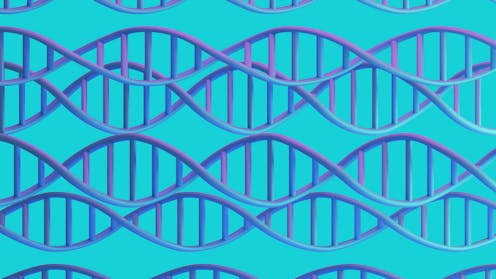Researchers uncovered hundreds of genes linked to OCD, providing clues about how it changes the brain − new research
- Written by Carol Mathews, Professor of Psychiatry, University of Florida

Obsessive compulsive disorder[1] has many unknowns, including what causes it, why symptoms can differ so much between people, how medication and therapy for it actually work, and why treatment is effective for some people and not for others. In our newly published research, my colleagues and I made a step toward unraveling some of these mysteries by shedding light on the genetics of OCD[2].
Obsessive compulsive disorder is one of the most impairing illnesses[3] worldwide. Affecting about 1 in 50 people globally, OCD is among the top 10 causes[4] of years lost to disability, leading to harmful effects on a person’s ability to work and function in the world and on their family.
Compared with people without OCD, a person with the condition has a 30% higher chance of dying prematurely[5] from natural causes, such as infections or other illnesses, and a 300% higher chance of dying early from nonnatural causes, such as accidents or suicide.
People with OCD experience obsessions – disturbing, recurrent and unwanted thoughts, fears or mental images – and compulsions, such as repetitive behaviors and rituals performed to ease the anxiety usually caused by obsessions[6]. For example, someone might wash their hands dozens of times or in a specific way to get rid of germs, even if they know it’s excessive or illogical. Avoiding certain places or situations to reduce anxiety or prevent triggering obsessions and compulsions is also common.
While the exact causes of OCD are unclear, researchers know that both genetic and environmental factors play a role in its development. OCD can run in families; studies attribute between 40% to 65%[8] of OCD cases to genetic factors. OCD that begins in childhood has a stronger genetic influence than OCD that begins in adulthood.
But unlike some genetic diseases caused by a single faulty gene, such as cystic fibrosis[9] or Huntington’s disease[10], OCD is influenced by hundreds to thousands of genes that each play a small part in disease risk.
My colleagues and I analyzed the DNA of over 53,000 people with OCD and over 2 million people without OCD, the largest study of this kind for this condition. We discovered hundreds of genetic markers[11] potentially linked to OCD – data we hope will ultimately lead to improved ways of identifying people who are at risk for OCD and, down the line, to better treatments.
How scientists study OCD genetics
To find the genes involved in OCD risk, researchers use a method called a genome-wide association study, or GWAS[12]. These studies compare the DNA of tens to hundreds of thousands of people with a disease of interest with the DNA of people without the disease, looking for tiny differences in the genetic material. These genetic markers may be linked to OCD or indicate the presence of other genes linked to the disease.
In a GWAS, scientists carefully test each of the millions of genetic markers across the genome to identify those found more often in people with OCD than in people without OCD. They then determine which genes those markers are associated with, where in the body they are active and how they might contribute to the condition.
GWAS studies look for genetic associations between different traits.We identified 30 areas in the genome linked to OCD, containing 249 genes of interest in total. Of those, 25 genes stood out[13] as likely contributors to the development of OCD.
The top three genes we found are also linked to other brain disorders such as depression[14], epilepsy[15] and schizophrenia[16]. Several other genes of interest for OCD were found in a region of the genome that plays a role in adaptive immunity[17] and has been associated with other psychiatric disorders.
Importantly, no single gene can predict or cause OCD on its own. Previous genetic studies have demonstrated that genes across all of the[18] 23 pairs[19] of chromosomes in people may contribute to OCD risk.
Genetic insights into OCD
Because the contribution of each genetic marker or gene to disease susceptibility is very small, GWAS are not useful for identifying genes that cause OCD for a given person. Rather, this kind of research helps scientists understand how the brain works in people with OCD and whether OCD shares genetic roots with conditions that commonly occur alongside it.
For example, the genetic markers we found to be associated with OCD were highly active[20] in several brain regions[21] known to play a role in development of the condition. These brain areas are collectively involved in planning, decision-making, motivation, error detection, emotion regulation, and fear and anxiety, all of which can malfunction in OCD.
We also found associations with a brain region called the hypothalamus[22], which converts emotions such as fear, anger, anxiety or excitement into physical responses. The hypothalamus has not been directly linked to OCD before, but it is part of a network of brain regions that may contribute to its symptoms.
Additionally, we found that certain types of brain cells – particularly medium spiny neurons[23] in a brain region called the striatum – were strongly linked to the OCD genes we identified. Medium spiny neurons play an important role in habit formation, the process by which a behavior becomes automatic and habitual – think compulsions. Specific receptors on medium spiny neurons are common targets for medications that are sometimes used to help treat OCD.
The results of our study can help researchers better understand the relationships between OCD and other conditions. We found genetic links[25] between OCD and several other psychiatric disorders, especially anxiety, depression, anorexia and Tourette syndrome. People with OCD also showed lower genetic risk for conditions such as alcohol dependence and risk-taking behavior, aligning with what doctors see in clinics: Many people with OCD tend to be cautious and avoid risks.
Surprisingly, we also found genetic overlaps[26] between OCD immune-related conditions. While having OCD appears to be linked to an increased risk of asthma and migraines, it may also be linked to a reduced risk of inflammatory bowel disease. These findings may lead to new insights about the role the immune system and inflammation play in brain health.
More effective OCD treatment
OCD is a complex disorder that can look very different from person to person. Understanding the genetic and biological factors behind OCD helps researchers move closer to better diagnosis, treatment and possibly even prevention.
As a practicing psychiatrist and researcher[27], I have spent my career working to understand the causes of OCD and to improve the lives of those who live with the condition. With larger studies and continued research, my team and I hope to better match specific biological patterns to individual symptoms.
In time, this could lead to more personalized and effective treatments – improving the lives of millions of people living with OCD around the world.
References
- ^ Obsessive compulsive disorder (doi.org)
- ^ shedding light on the genetics of OCD (www.nature.com)
- ^ most impairing illnesses (doi.org)
- ^ top 10 causes (www.who.int)
- ^ higher chance of dying prematurely (doi.org)
- ^ anxiety usually caused by obsessions (www.psychiatry.org)
- ^ Jena Ardell/Moment via Getty Images (www.gettyimages.com)
- ^ between 40% to 65% (doi.org)
- ^ cystic fibrosis (www.nhlbi.nih.gov)
- ^ Huntington’s disease (www.ninds.nih.gov)
- ^ hundreds of genetic markers (www.nature.com)
- ^ genome-wide association study, or GWAS (doi.org)
- ^ 25 genes stood out (www.nature.com)
- ^ depression (doi.org)
- ^ epilepsy (doi.org)
- ^ schizophrenia (doi.org)
- ^ plays a role in adaptive immunity (doi.org)
- ^ all of the (doi.org)
- ^ 23 pairs (doi.org)
- ^ highly active (www.nature.com)
- ^ several brain regions (doi.org)
- ^ called the hypothalamus (doi.org)
- ^ medium spiny neurons (doi.org)
- ^ triocean/iStock via Getty Images Plus (www.gettyimages.com)
- ^ genetic links (www.nature.com)
- ^ genetic overlaps (www.nature.com)
- ^ practicing psychiatrist and researcher (psychiatry.ufl.edu)
Authors: Carol Mathews, Professor of Psychiatry, University of Florida




